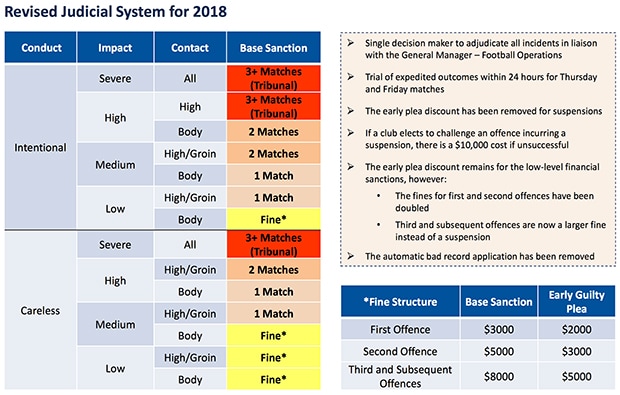The AFL has today written to all clubs to advise the AFL Commission had approved changes to the operation of the Match Review Panel for the 2018 Toyota AFL Premiership Season, at its meeting in Melbourne earlier this week.
AFL General Manager Football Operations Steve Hocking said the Commission had approved a number of changes to the system, after a detailed review following the conclusion to the 2017 season.
Mr Hocking said the key changes were:
- Move to a single decision maker model for the Match Review Panel, instead of using a panel of former players
- The trial of expedited outcomes in 2018 by adjudicating Thursday and Friday matches within 24 hours
- Increase to the quantum of low-level financial sanctions and remove the third low-level offence equating to a one-match suspension, replacing it with a larger fine
- Remove the one-match discount for an early plea, and replace it with a $10,000 club cost in the event the charge is unsuccessfully challenged
- Remove the automatic bad record loading but retain the discretion of the MRP to refer any incident to the Tribunal on account of poor player record (where it can be considered in the final sanction)
- Retain the current threshold for Brownlow ineligibility, whereby a one-match suspension rules a player out of the award (A financial sanction only for a player means he remains eligible for the Medal)
- Clarify that ‘exemplary record’ refers to matches played at AFL/state league level only
- Modify the Table of Offences such that the sanction for direct referrals is specified to be at least three matches
- Amend staging to a financial sanction for a first offence under the same criteria as other fixed financial sanctions
- Appeals of Tribunal determinations be limited to the player/person who is the subject of the charge and the AFL GMFO
- Retain the current system for umpire match day reports but do not compel their attendance at Tribunal hearings
- Continue to utilise ‘Misconduct’ or ‘Attempt to Strike’ to financially sanction strikes to the head with negligible force
“The AFL Football Operations Department, under myself, has had a detailed review of the MRP process since the conclusion of the 2017 season,” Mr Hocking said.
“Since its introduction more than a decade ago, replacing the system where all incidents were heard by the AFL Tribunal, the MRP has greatly simplified the overall process, whereby penalties are structured and players have the ability to accept a lesser sanction and avoid a Tribunal hearing for lower-level incidents.
“It has remained though through the recent 2017 season that
Mr Hocking said the number of Thursday and Friday night matches, and the focus around these games
He said low-level offences would now incur increasing financial sanctions, rising from $1500 (first offence) and $2500 (second offence) to $3000 and $5000, but the AFL had removed the previous instance where a player would face a one-game suspension at the third offence. A player would now face an increased $8000 sanction at the third offence as a deterrent.
“Alongside consistency of decision making and the rationale for decisions, the fine quantum for some offences, the disincentive to challenge any charge at the Tribunal and the application of a bad record
“The focus of this review has been to retain the strong parts of the system that
“Clubs will also have a greater opportunity to contest cases at the Tribunal and a bad record will not be automatically considered as part of a player’s history, but can be considered as part of a final sanction.”

The Commission approved the changes and Mr Hocking said previous MRP member Michael Christian would now take the role as the single Match Review Official to review all offences. Christian has a long history
“Eligibility for the Brownlow Medal will be determined on the basis only of whether a player has missed a game through suspension in that particular season,” he said.
It was also determined that umpires would retain the right to lay match day charges, after discussion as to whether this should be continued under the MRP system. While it was argued by some players and clubs that a report, which was later withdrawn, could affect a player on the day of a match, the predominant view was that a report on the day for any serious offence was a key tool for the umpires in managing players on the ground during any serious incident.




